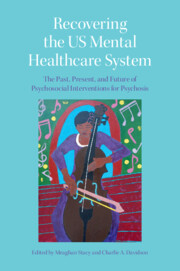 Recovering the US Mental Healthcare System
Recovering the US Mental Healthcare System Book contents
- Recovering the US Mental Healthcare System
- Recovering the US Mental Healthcare System
- Copyright page
- Dedication
- Contents
- Figures
- Tables
- Contributors
- Acknowledgments
- 1 Recovering the US Mental Healthcare System
- Part I The Past
- Part II The Present
- 5 Training US Community Mental Health Centers in Evidence-Based Coordinated Specialty Care for First Episode Psychosis
- 6 Implementing Evidence-Based Psychosocial Interventions for Psychosis
- Part III The Future
- Index
- References
5 - Training US Community Mental Health Centers in Evidence-Based Coordinated Specialty Care for First Episode Psychosis
Observations from the NAVIGATE Program Trainers
from Part II - The Present
Published online by Cambridge University Press: 03 March 2022
- Recovering the US Mental Healthcare System
- Recovering the US Mental Healthcare System
- Copyright page
- Dedication
- Contents
- Figures
- Tables
- Contributors
- Acknowledgments
- 1 Recovering the US Mental Healthcare System
- Part I The Past
- Part II The Present
- 5 Training US Community Mental Health Centers in Evidence-Based Coordinated Specialty Care for First Episode Psychosis
- 6 Implementing Evidence-Based Psychosocial Interventions for Psychosis
- Part III The Future
- Index
- References
Summary
Building on positive research findings in Europe, Canada, and Australia over the past 30 years, the US National Institute of Mental Health (NIMH) funded two large trials of Coordinated Specialty Care (CSC) for first episode psychosis approximately 10 years ago. These studies found that participation in CSC, which includes both pharmacological and manualized psychosocial treatments, resulted in greater treatment retention, improved quality of life and work/school rates and reduced psychopathology among participants (Dixon et al., 2015; Kane et al., 2016). The authors of this chapter were intervention co-developers and trainers in the NIMH funded Recovery After an Initial Schizophrenia Episode (RAISE) national randomized controlled trial comparing CSC to customary care in 34 non-academic “real-world” community mental health clinics. The psychosocial components of the RAISE CSC intervention, entitled NAVIGATE, are manualized and available at navigateconsultants.org. The authors have now provided intensive onsite training and consultation in NAVIGATE in over 20 US states, typically to a combination of state and local community mental health agencies. In this chapter, they will present an overview of NAVIGATE and the national training effort, and then highlight both success and challenges in working to improve evidence-based first episode psychosis mental health treatment in the USA on a national and local level.
Keywords
- Type
- Chapter
- Information
- Recovering the US Mental Healthcare SystemThe Past, Present, and Future of Psychosocial Interventions for Psychosis, pp. 103 - 127Publisher: Cambridge University PressPrint publication year: 2022
